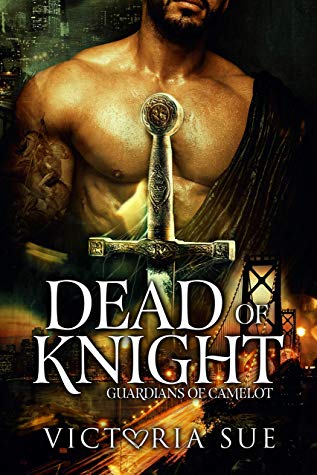Reviewed by Stephen K.
 TITLE: Dead of Knight
TITLE: Dead of Knight
SERIES: Guardians of Camelot #2
AUTHOR: Victoria Sue
PUBLISHER: Victoria Sue
LENGTH: 242 pages
RELEASE DATE: Jan 21, 2020
BLURB:
A battle is coming…
…and the immortal knights aren’t ready.
Will an orphan be the key?
For fifteen hundred years Lucan has waged war with the greatest enemy the world has ever known
…and fought the ancient curse that means loving someone with all his heart and soul might be the reason they die.
Tom wasn’t supposed to be born… twice.
How, as a young child, had he even heard the monsters at all?
How, as an adult, is he caught up in a deadly battle to fight evil, but cannot get one stubborn man to even acknowledge he exists?
Time is running out, not just to unravel the secrets of Tom’s destiny, but for Tom to show Lucan that loving someone with all that they have doesn’t mean breaking their heart.
Or does it?
REVIEW:
I’m torn about how to review or rate this book. It’s an amazingly good story told in a flawed way.
The author crafts an incredible, complex tale with many likable characters and interesting developments; but the clunky transitions between flashbacks, dream sequences and single character reflections is not handled at all well. At times it felt as if that were the writer’s intention, or possibly she was so familiar with the material that she was unaware of just how confusing the presentation was.
One early example… Tom’s ability is foreshadowed a bit too cleverly in the prequel to chapter 1. “Waking” a sleeping mouse that had been caught in a trap could easily have been a normal rather than a paranormal event. I had to empty a few traps growing up and the mice weren’t always as dead as one would hope. I’m not generally slow on the uptake but it was several more chapters before I began to realize that opening bit was foreshadowing of Tom’s resurrective ability.
In book one I was very willing to forgive ambiguity as incomplete world-building, but in this, the 2nd book, my tolerance for that type of thing was sorely tried. And this tale seemed unnecessarily muddled. I’m all for characters telling each other their backstories in dialogue form. In fact, that technique was employed brilliantly in chapter one of the first book. But here that technique was ruined due to the characters being interrupted amidst their expository dialogue, leaving a hard to follow narrative. Also, at times in this book, it was nigh on impossible to determine just exactly, what we were reading; Historical backstory? Character speculation? Character caught in a sorcerous illusion? The “backseat author” in me thinks that at 242 pages, the problem was too much going on at one time here.
The author might have taken a few more pages, spread things out a bit, possibly moved some of the more important flashbacks to their own chapters, rather than inter-cutting them with present-day action. Perhaps even large chunks of Rohan’s tale might have been relegated to its own chapters. The resulting tale might have been slightly longer, but more enjoyable and less confusing.
In a related complaint, the reader wasn’t always adequately reminded of some of the key revelations from the first book. The details had been presented but long enough ago that a reminder would have cleared up a lot of my confusion. Of course I’ll assume part of the blame for this in that I read another unrelated novel between books 1 & 2. Nevertheless. A few key reminders would have been helpful.
Finally, given the amount of time these folk spend speculating about their relationships, precious little time is spent actually communicating. While this is a common screenwriter trick for stretching out a story it’s not as acceptable in books and audio-books. Several reviewers mentioned this in book 1 but I mostly discounted that as “shallow reader fatigue,” but by the middle of book 2, I was beginning to understand that POV. Of course, a crucial part of the plot hinged on these continued relationship difficulties, but I’d like to think there might have been a better way to get there without the trope of seemingly unmotivated misunderstandings between characters.
Overall, I think that there is a rich & amazing epic. The story merits a solid five hearts, but the difficulties in telling it bring that down to a three and a half.
One final note from the history nerd in me: These 1500 year old knights seem to place a LOT of undue significance on the 18th birthday. During the times in which they lived girls as young as 12 were sometimes married. And lads as you as six had been sent to be pages and hopefully squires in the courts of nobles. Though full knighthood tended to come later, often 22 or beyond, youngsters of the period were mostly looked on as tiny, less useful adults. Not in terms of rights, but certainly in terms of responsibilities. Child labor continued well into the 1930s in the USA and it still continues in many parts of the world. I seriously doubt that the knight here would be quite so concerned about an arbitrary 18 year old “age of consent.” That said, I’m more than willing to set aside that disbelief and enjoy the romantic thrill-ride that is The Guardians of Camelot series.
RATING: ![]()
BUY LINK:
